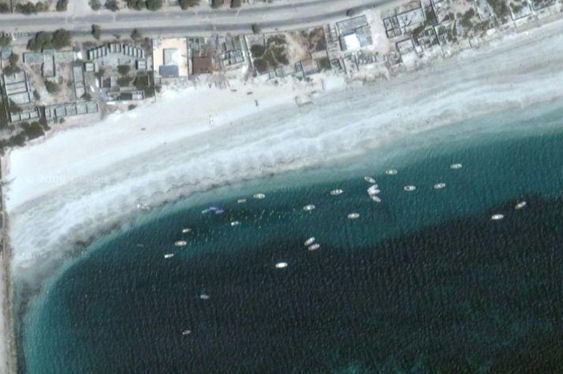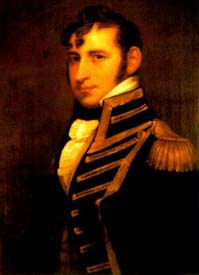Springtime for NATO Action
Perhaps the actions of the U.S. and French navies last week and all of the media publicity generated in the U.S. and
Europe will embolden Western governments to put an end to Somali piracy the old
fashioned way – interdict pirate ships before they attack, and invade the nest of
pirates where they live. In 1803 and ’04 Lt. Stephen Decatur of the U.S. navy attacked
the Barbary pirates in Tripoli and put an end to piracy and ransoms in the Med that
the great European powers had been putting up with for years. At the time the U.S.
navy was small and weak, but it was full of resolve and courage. And, President
Jefferson was a leader. British Admiral Lord Nelson is said to have called this
"the most bold and daring act of the Age".
 Satellite photo of pirate ships anchored off the beach at Mogadishu. |
For years the U.S. military has been stopping and boarding suspected drug runners
in International Waters and even in some national waters with impunity. Why not do the same with the Somali pirates? We all know what the pirate ships look like.
And we all know that real-time satellite photos are available to the U.S. military,
so the argument that the area is too big for Western navies to adequately patrol,
is an excuse that doesn’t hold water, in our opinion. What is needed is resolve
by Western governments – or willing governments. If the U.S. can swoop into Panama
and grab president Noriega, it can certainly drop into a few mud-hut villages in
Puntland and grab a dozen pirate leaders.
That is essentially what President Thomas Jefferson authorized Lt. Stephen Decatur
to do in 1803. The pirates were overwhelmed by Decatur's audacity and the resolve
of a small band of marines.
 Capt. Stephen Decatur. |
Given command of the brig Argus in 1803, Stephen Decatur took it to the
Mediterranean for service in the First Barbary War against Tripoli. Once in the
combat zone, Lieutenant Decatur commanded the schooner Enterprise and, on 23 December
1803, captured the enemy ketch Mastico. That vessel, taken into the U.S.
Navy under the name Intrepid, was used by Decatur on 16 February 1804 to
execute a night raid into Tripoli harbor to destroy the U.S. frigate Philadelphia,
which had been captured after running aground at the end of October 1803.
This daring and extremely successful operation made Lieutenant Decatur an immediate
national hero, a status that was enhanced by his courageous conduct during the 3
August 1804 bombardment of Tripoli. In that action, he led his men in hand-to-hand
fighting while boarding and capturing an enemy gunboat. Decatur was subsequently
promoted to the rank of captain, and over the next eight years had command of several
frigates.
We are heartened that presidents Obama and Sarkozy had the resolve to unleash their
navies on the pirates. In these situations, innocent people or hostages are bound
to be killed along with the bad guys, but this is the price free men have to be
willing to pay to stamp out criminality on the high seas. We hope the rest
of the world will follow their leadership.
We would like to hear our readers solutions to the Somali pirate problem…